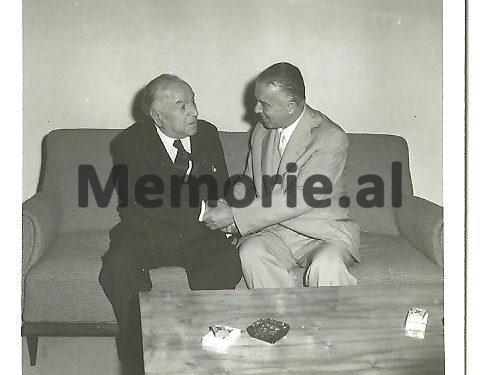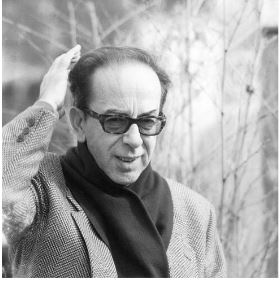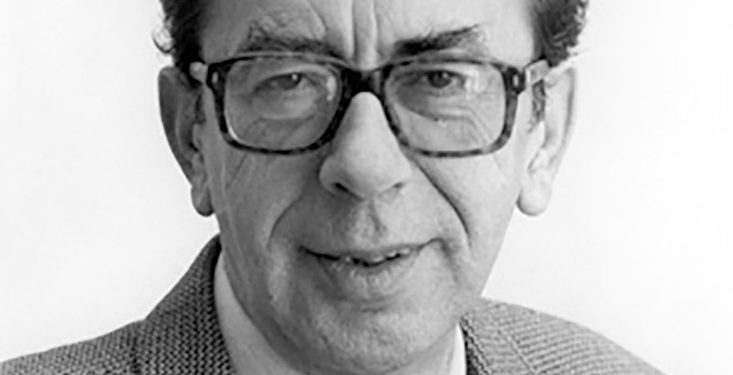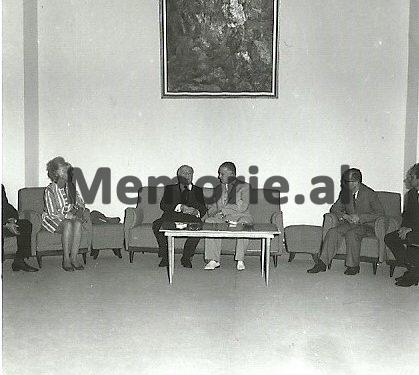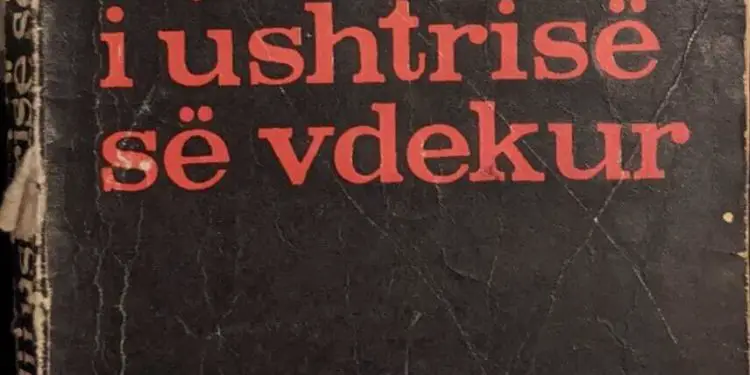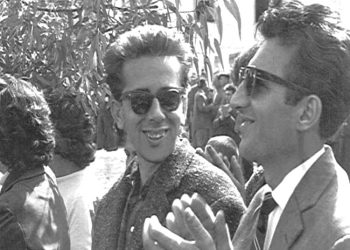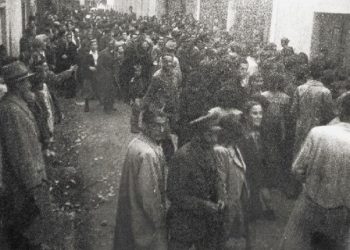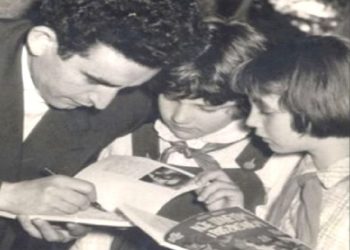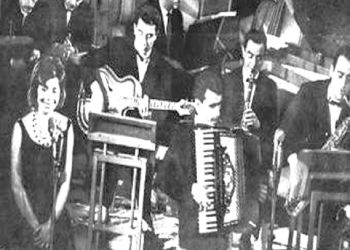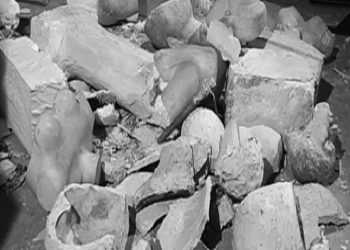By Dashnor Kaloçi
Viktor Eftimiu: “I want to translate the novel ‘The General of the Dead Army’, by Ismail Kadare, which is one of the best literary works of today’s world literature”!
Memorie.al / At the end of June 1971, the well-known Romanian writer and playwright of Albanian origin, academician Viktor Eftimiu, former honorary president of the League of Writers and Artists of Romania, (born in the village of Boboshtica in Korça on January 24 1989), made a friendly visit to our country, where he reserved a very warm reception, not only from his hometown in Boboshtica, but also from his colleagues in the League of Writers and Artists of Albania. Before leaving Albania, the well-known Romanian writer (who at that time, i.e. in his lifetime, had a bust in Romania and was an honorary member of several European academics), was also given a reception by the Albanian dictator, Enver Hoxha. where, among other things, they discussed and evaluated Albanian literature, mentioning by name only the well-known writer Ismail Kadare and his novel, ‘General of the Dead Army’, recently translated and published in France. For more about this, etc., we are publishing Enver Hoxha’s full conversation with the well-known Romanian writer and academic, who passed away a year later in Romania, at the age of 83.
THE DOCUMENT WITH THE MINUTES OF THE CONVERSATION BETWEEN ENVER HOXHA AND THE WRITER OF THE WELL-KNOWN ROMANIAN ACADEMIC OF ALBANIAN ORIGIN, VIKTOR EFTIMIU
From the conversation with the writer Viktor Eftimiu
July 2, 1971
Comrade Enver Hoxha received the Romanian writer of Albanian origin at the headquarters of the Central Committee of the Party and had a warm conversation with him.
COMRADE ENVER HOXHA: Welcome. We are very glad that you came to our country, which is also your birth country. Our people wanted you to come even further to Albania, to your hometown, which you have not forgotten.
COMRADE VIKTOR EFTIMIU: My desire was also to come forward. However, I have constantly followed with admiration the progress of the country, the patriotism of the Albanian people, the wonderful, simple, willing and proud youth, your skilled people with a strong discipline, who do not consider any difficulties and who put their interests above all of the people. All this situation created in the new Albania has been achieved thanks to your wonderful and glorious leadership.
COMRADE ENVER HOXHA: You are known by all our people not only as a man of great value and culture, who made a great contribution to the Romanian people, but also because you never forgot your country. Of course you loved and longed for Albania, you believed that it would gain independence, to build a better life for the people. You felt this and wrote it.
COMRADE VIKTOR EFTIMIU: You are today one of the great people of Europe. I am very happy that I came to see You and my country that I have always loved and I am sorry that I could not come here long ago.
COMRADE ENVER HOXHA: I myself lived in Korça, where I finished my secondary studies, so I know Boboshtica, your hometown, well. When we were young, on Saturdays we went to Dardhë, Boboshticë, Dvoran and other villages near the city. Sometimes I would go with some friends to a villager in Boboshtica and we would lie on the grass with him. He had two manas, which I enjoyed when they were full of grains. “Why don’t you eat manna”, he told us, although he was very poor and probably lived by the production of brandy, which he extracted from these two manna. He was eager to give and please us, which proved that he had a very good heart.
When you go from Korça to Boboshtica, you will see that there is a lot of mana there. For the people of Boboshtica, it will be an important event to receive the great writer in their bosom. Miserable was our situation before the liberation. But this poor condition of the working class, the peasantry and all our people passed forever, because the people fought on their own and won. You too have fought for the people, that is why their enemies have made you suffer, but you, with the help of the people, have always triumphed. The people, with our Labor Party at the head, never forget this.
COMRADE VIKTOR EFTIMIU: We must love him and work to always move the people forward, because he has given everything for us.
COMRADE ENVER HOXHA: We tell our comrades to live knee-to-knee with the people, to listen and understand them, to always understand and implement their wishes. The party teaches us never to forget this. Connections with the people gave us victory, and, rightly led by the Party, our patriotic people gained confidence in themselves and nurtured boundless faith in the Party. During the war, we did not touch the wealth of the people, therefore the masses of the people shared the bread they had, even a morsel, with us, with the communists and the partisans. After the liberation, we had great difficulties, but in a very short time we overcame them, because the people, just as they were mobilized in the struggle for liberation, joined the construction work with great, indescribable enthusiasm.
This, the strength of the people, was something wonderful. In the beginning, we didn’t have many things, we lacked even the most necessary things, we didn’t even have staff, engineers, specialists and others, and we asked ourselves the question: “How can we build the country, roads, schools, buildings, etc. “? Then we appealed to the youth and in less than two years, we rebuilt everything that was destroyed during the war.
At the same time we studied. The party gave the directive that whoever knew how to write should go organize the work of teaching the people, teach them everything they knew about themselves. “Take the black plate and go to the people was the call that the Party made to all those who knew how to read and write. And now we have made general progress, we have built our own University and a number of other higher schools; we created a good generation of popular writers and artists.
COMRADE VIKTOR EFTIMIU: All excellent.
COMRADE ENVER HOXHA: Most of these are not professionals, they are rather talented cadres, devoted to creativity, who still have life ahead of them, who are inspired and have the people as a great example.
COMRADE VIKTOR EFTIMIU: You have spoken very well and you are very right about this.
COMRADE ENVER HOXHA: We are now on the threshold of laying down the directives of the fifth five-year plan, which opens up even greater prospects for our people. During this five-year period, we will further develop the industry, we will build other hydropower plants, new factories and combines, other roads and railways will cross Albania, more agricultural products will be added. At first we worked to drain the swamps in the plains, now we have sewn more to the hills of the mountains, to make them fertile as well as the plains. From the very beginning, we set out from the noble goal, so that our people would no longer suffer for a bite to eat. You may not have ever suffered economically, but we know that your father was poor, so you easily understand what it means to fight to eradicate poverty.
The Romanian people have always nurtured friendly feelings for the Albanian people. During the period of the Albanian Renaissance, our patriots who worked at that time in Romania, found it easy to develop their patriotic activity, with publications, etc., to develop the culture of the people and, through it, to keep national feelings high. The dream of the renaissance in this direction has become a reality for us today. The party has made mass development of culture and education not only in the city, but also in the countryside and not only in the rich plain areas, but also on the top of the mountains. The party works so that not only these 2 million or 2.5 million people, as we will become at the end of this five-year period, but also when we reach 5 million and more, everyone will work and be able to live well.
In us, everything is done for the happiness of the people, to ensure justice and democracy in the country, because justice and democracy are matters of the people, which we do not allow anyone to violate. Our party works a lot with the youth, makes them know the fates of the ancestors and fathers, that the new generation sees only that today people in our country live happily and has not known either the suffering or the past war. On the other hand, we teach the youth not to forget that imperialism aims to destroy the happiness of the people, our freedom, therefore, they must keep the gunpowder, as all the people do, always dry. The Albanian people are not afraid to fight and have shown this throughout the centuries. I consider you a brother, because in fact we are brothers of the same blood, friend Viktor, that’s why I speak openly.
We tell young men and women to work, study, learn and sacrifice for the people, so that they can live happily. We emphasize this to them that there are also those who think that, after finishing their studies, they became knowledgeable, “scholars”. The party draws their attention, advises them not to think like that. Man must learn all his life and he must still be clear that there is no one more knowledgeable than the people, no wiser and wiser than him, that everything that has been realized has come out of work and great centuries of experience. of the people. We still have a lot to do to meet the needs of the people, which are great; we still have a lot to build, so we are tasked to always work tirelessly. You were very young when you left your homeland, which has undergone great changes since then.
There are big changes between today and yesterday in our country. With your eyes, you have seen many countries in the world, but we are sure that you look at Albania with your heart. We also have flaws and things that have not been done yet, but your heart feels that those gaps left by the past will be corrected and the time for this will not be far away. Marcel Kasheni visited Albania 3-4 years before he died. I met him and spoke to him personally. He was a good man, one of the staunchest defenders of Marxism-Leninism in France. When he returned to his country, he said to the French: “If you are going to Albania today, don’t make fun of its roads. Keep in mind that even Paris, which is so beautiful, was not built in a few years, it took centuries to build it. As for Albania, give it 10-15 years and then women can walk on its boulevards, wearing high-heeled shoes”.
COMRADE VIKTOR EFTIMIU: As I emphasized to those present, yesterday, in the meeting that was organized for me, the sacrifices of each one, the sacrifices of simple and intellectual people for the greatness of this country will create conditions for this small nation to become a nation of big.
COMRADE ENVER HOXHA: I read your speech yesterday. It was a wonderful speech, woven with words and feelings from the mind of a developed and cultured man, of a man who speaks to the masses with the love of the people, who speaks to artists and writers from the heart, with feelings of deep brotherhood. Therefore, our writers and artists have a lot of respect for you, for your talent, which will remain immortal, because in the works you have created, you express clear popular ideas that touch the hearts of ordinary people and that makes touch the heart of the people, it never dies. There are others who write, but the masses throw their works in the basket, and there are few people like you.
COMRADE VIKTOR EFTIMIU: I sincerely feel this in your words.
COMRADE ENVER HOXHA: Albanians don’t know how to make compliments with their eyes and cheeks, they express what they have to say openly, fearlessly and clearly, like the water that comes out of the spring near the rock. We who have suffered a lot always tell the truth.
COMRADE VIKTOR EFTIMIU: Now that I saw you and am listening to you myself, I understand a little better why the entire Albanian people follow you, why they love you so much. With this, you have achieved an extraordinary victory.
COMRADE ENVER HOXHA: We were very pleased that you came and we want you to stay in Albania as long as possible, because we want to have you in our warm bosom, for as long as possible. But we leave that up to you to decide.
COMRADE VIKTOR EFTIMIU: I was once in the Soviet Union during Stalin’s time and I met him. He was a great man. I told Stalin then that I needed a long time to visit their great homeland and he answered me with a pleasant smile: “Who is stopping you? Look at it, look at it”!
COMRADE ENVER HOXHA: However, you will live long. We want you to live as long as our mountains, so that you come to Albania again, where you will always find the warmest brotherly hospitality, as a son of this people. That’s why we want you to be strong, so that your health is always good.
COMRADE VIKTOR EFTIMIU: Since I came to Albania, I feel as if new strength is coming to me, as if I am being renewed.
COMRADE ENVER HOXHA: The Albanian people and the Romanian people need such good people like you. Love for the people and the homeland makes you young, rejuvenates you, because the people are always young. There is no doubt that over time, whether we like it or not, the laws of nature act on the organism, but, knowing these laws, we will make sure that we live as long as possible. A professor named Rostand has written a lot about such things. He advises people to have courage, not to give up when the years pass. Therefore, when you go to the district of Korça, to Drenovë and to Boboshtice, you will see how you will become, physically, even 30 years younger.
When I was a student, as I told you, I often went with my friends from Drenova and Boboshtica and we always sang “One day I went from Drenova, I saw a young girl…”. We were young and we really liked this song. Then there was also a choir that, among others, sang such songs. This choir is even today, but now they call it “The Choir of the Elders”. Many of those who are still alive, but who were once young, like, for example, Ilo Moskoja and others, sing there the old songs of Drenova and Boboshtica. Don’t forget, Comrade Misto, now that you are going to Korça with Comrade Viktor, to organize a concert in honor of the master, with songs from this choir, with songs from the folklore of his native village, and then let the honorable friend see, how to really get younger.
Mistoja herself is from Korça, while I am from Gjirokastra, and we are glad to hear people talking about our cities. I have also been to Romania 2-3 times, when Dezhi lived. For the first time, I went there illegally, but Dezhi met me at the airport, who took me in his car. When I sat down in the car, something hard hit me from behind. When I put my hand down, I remember that it was the Mauser pistol I was holding. Those were very difficult times, so the weapon had to be carried. Dezhi told me to go to a friend of his, outside Bucharest, to talk. This was a communist peasant who had a beautiful country house and a very welcoming mother. It was in this house that we discussed with Dezh. We visited that village and its museum, which was very interesting. The museum, in particular, was the only object there and contained many characteristic things of the village.
Various village houses, ethnographic objects, etc. were exhibited there. The Romanian people are cultured. Then from there we went to the Central Committee. When we opened the door to enter the room where Kishinevski was, we saw that the whole room was full of banknotes, because, as they told us, only there were they safe. After the discussions we went to the former Royal Palace, a beautiful little building with arches. We also had a meeting there, then went to sleep. I remember that in one of the rooms there was a big book on the table, which was the Royal album.
COMRADE VIKTOR EFTIMIU: I would like to make a translation of the works of Albanian literature. The novel “The General of the Dead Army”, by the writer Ismail Kadare, seems to me to be a very high manly literary work, one of the best in today’s world literature.
COMRADE ENVER HOXHA: Appreciating our writers in this way, your appreciation is a great encouragement for them.
COMRADE VIKTOR EFTIMIU: Are there other writers of this rank?
COMRADE ENVER HOXHA: Of course, there are others of this rank, but with our literature, the bourgeois press has organized the conspiracy of silence. With the publication of this novel by Ismail Kadare, a window has been opened to the world. However, in our literature there are other literary works, as good as “The General of the Dead Army”.
COMRADE VIKTOR EFTIMIU: I am also taking an Albanian theatrical piece to translate, then I will talk about putting it on stage, in the Romanian theater.
COMRADE ENVER HOXHA: There is a great interest not only inside, but everywhere and outside, for our literature. Now, everywhere in the world, people are more interested in it, and we finally find that our writers are cracking.
COMRADE VIKTOR EFTIMIU: I will be happy to live these days with the people of my hometown and see how Boboshtica has changed since the time of my youth.
COMRADE ENVER HOXHA: Even Korça has changed a lot, whole new streets have been built, with residential houses and shops, important industrial works, such as the Knitting Factory, the Instrument Factory and many other factories. Agriculture, in particular, has developed a lot compared to the past. Korça is one of the most developed agricultural regions in Albania. In the agricultural cooperatives of this district, the harvest begins now. As you will see for yourself, entire coasts that were barren until yesterday are now forested with fruit trees. There are many apples in Korça, but there are also vineyards. Even now there they have learned to produce wine properly.
A French writer named Monmuso, a very good friend, visited Albania once and, although he was old, he also went to Korça, during the grape harvest. He remembered on this occasion, the season of the grape harvest in his Champagne. In Korça, Monmusoi sang and danced like a young man and was very satisfied. When we met, we talked about many things and, about everything he saw in our country, he spoke to me with great enthusiasm, but about our summer, he made remarks to us. Later, the production of wine has improved a lot, that’s why our export wine is in high demand in many countries around the world because it is pure. Even the English and the French ask us for it, as well as others, because it is good.
Those who have set their eyes on one of our types of wine and have chosen it, do not abandon it anymore, because we do not cheat, as they do outside in the beverage industry. We have tasked our producers and trade employees to always be honest, because in trade we do not start only from the need to sell our products, but also to preserve the good voice of Albania in terms of honesty and purity. By doing so, there are many cases that different traders covet the products of our country, because they have created confidence that our export products are without tricks. This way our country will become even more popular. We have suffered a lot from foreigners in these directions, so we do not allow ourselves to harm others with our products. We fight for honesty, in all directions.
COMRADE VIKTOR EFTIMIU: You have made many sacrifices to achieve all these successes and in all areas of life. I am very happy that I came to Albania and in a special way, that I met you and saw you with my eyes. I saw in Albania the strength of the people and the great love they, and especially the youth, have for You. because You make all these sacrifices, not for Your personal glory, but for the happiness of the homeland and for the good of the people. That’s why I look with confidence to the happy future and greatness of this country.
COMRADE ENVER HOXHA: Thank you for your warm and heartfelt words, which we will never forget. They are a great encouragement to us. I wish you further success in your work. Long life and good way!
(Published for the first time, according to the notes taken at this meeting, found in the Central Party Archive).
Who was Viktor Eftimiu?
On November 27, 1972, in the capital of Romania, Bucharest, one of the most popular centers of patriotic, political, social and cultural activity of Albanians in the past, the great Romanian writer of Albanian origin, Viktor Eftimiu, who since 1905 died , when he published the first poem, until his death, he wrote more than 120 different literary works (poems, stories, novellas, dramas, novels, literary and theater criticism, travel notes, journalism, etc.), enriching literature Romanian and international, with works of a high artistic level.
Born in January 1889, in the town of Boboshtica in Korça, Viktor Eftimiu was forced to leave his hometown and go into exile with his family at the age of 9. He settled in Romania, where at that time many of his compatriots had gone, some to secure a bite to eat, and a good part, to engage in patriotic activities, since their homeland, occupied by the Turks, had been plagued by the suffering of great misery and every initiative of the patriots to make any movement was drowned with violence and blood.
The primary school that he had started in his homeland in the Greek language, because the Albanian school could only be dreamed of during the brutal Ottoman occupation (an occupier that some truthers today say co-existed with the Albanian people, while the descendants of those savage hordes call them brothers ), Victor continued it in Bucharest, in the Romanian language. He had no difficulty with the language. In a very short time, he managed to acquire Romanian so well that he was not distinguished from his Romanian peers.
From a young age, he was faced with the difficulties of life, so he was forced to work and, at the same time, to be educated. From the age of 16, when he published his first poem in the magazine “Shpresa”, his name began to appear more and more often in the pages of Romanian newspapers and magazines of the time. The poet dedicated his first poetic creations to the severe social wound of the time, exile, because he himself was an exile and felt the pain of this wound better than anyone. Many of his first creations are permeated by longing for his homeland, which, although it was far away, he constantly kept in his mind and heart. The works of the period before the Second World War, as well as the later ones, are permeated by the patriotic spirit and deep social humanism.
During nearly seven decades, as he was engaged in literary creativity, Viktor Eftimiu wrote works of various genres, among which, here we are mentioning the poetic volumes ‘Poems of loneliness’, ‘Extinguished candles’, ‘Swans’, ‘Song of regret’ ‘,’ Underground Night’, ‘Mirrors’, ‘Language Anthem’ and others, dramas;’Na wasta mos na ista’ (this drama has been staged more than a thousand times), ‘Black Beauty’, ‘Akim’, ‘Glafira’, ‘Master Manole’, ‘Don Juan’, ‘Thebaida’, ‘Prometheus’ etc., comedies;’The Frog Inspector’, ‘The End of the World’, ‘The Parade’ and ‘The Man Who Saw Death With His Eyes’ (this comedy has been staged on Romanian and foreign stages more than two thousand times and Albanian theaters have also staged it in Albania and Kosovo), the novels ‘Two crosses’, ‘Man without name’, ‘A love in Vienna’, ‘Kimoni me yje’, etc., volumes with stories;’Soulless’, ‘Wedding Gift’, ‘Confession of a Clown’, ‘In the Prisons of Istanbul’, etc., nonfiction volumes;’The magic of words and Akademos’, volumes for children ‘Children of China’, ‘Little Man’, ‘Sweet Cake Rabbit’, ‘Brave of the Hills’, etc.
Works with Albanian dough are the novel “Two crosses”, the novels “Risto Dardha”, “Katelina”, “Smail Dënusha” and many poems, which are filled with longing for the homeland and for the compatriots, with whom he had the opportunity to be longing. during his last visit, which he had made to Albania, in May 1972. This visit, the magnificent reception they had given him, especially the fellow villagers of Boboshtica, had left an indelible impression on him. Not even two full months had passed since his visit to the then socialist Albania, and I, together with my fellow student, Baki Ymerin (who currently lives in Bucharest, Romania, is the editor-in-chief of the creative literary magazine ‘Alshqiptari’, publicist, translator and tireless activist of the national issue), we had the honor of meeting this great personality at his home, in the Çishmixhiu flower garden.
By the way, apart from the fact that we had talked about literature and about the dire situation of the Albanian people who were living under the dictatorial regime of Enver Hoxha and about the Albanian people in the former Yugoslavia, deprived of all basic rights, not only national, we had seen Eftimiu’s entire journey, immortalized in hundreds of photographs. Seeing those photographs that had recorded the warm, magnificent reception that was reserved for Viktor Eftimiu, wherever he went, from his Boboshtica to the warm reception at the League of Writers and Artists of Albania, it seemed to us that we too had been part of that event, of those unforgettable emotions, at a time when Albania could not even be seen on television.
For the great and invaluable help he has given to Romanian literature, Viktor Eftimiu has been honored with high titles, such as academician, honorary president of the Writers’ League of Romania, he has been an honorary member of several European academies and he has been the writer of only in Romania, whose bust was erected during his lifetime. Memorie.al
Hajro HAJRA, Arizona, USA




